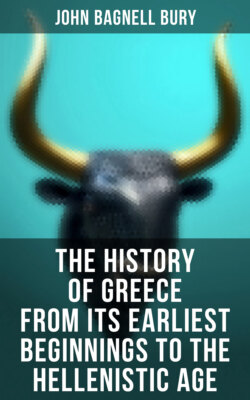Читать книгу The History of Greece from Its Earliest Beginnings to the Hellenistic Age - John Bagnell Bury - Страница 26
На сайте Литреса книга снята с продажи.
SECT. 8. POPULAR DISCONTENT IN GREECE
ОглавлениеThe advance of the Greeks in trade and industry produced many consequences of moment for their political and social development. The manufactures required labour, and a sufficient number of free labourers was not to be had. Slaves were therefore indispensable, and they were imported in large numbers from Asia Minor and Thrace and the coasts of the Euxine. The slave-trade became a profitable enterprise, and the men of Chios made it their chief pursuit. The existence of household slaves, generally war-captives, such as we meet in Homer, was an innocent institution which would never have had serious results; but the new organised slave-system which began in the seventh century was destined to prove one of the most fatal causes of disease and decay to the states of Greece.
At first the privileged classes of the aristocratic republics benefited by the increase of commerce; for the nobles were themselves the chief speculators. But the wealth which they acquired by trade undermined their political position. For, in the first place, their position depended largely on their domains of land; and when arose to compete with agriculture, the importance of land necessarily declined. In the second place, wealth introduced a new political standard; and aristocracies resting on birth tended to transform themselves into aristocracies resting on wealth. The proverb “money makes the man” now came into vogue. As nobility by birth cannot be acquired, whereas wealth can, such a change is always a step in the direction of democracy.
On the other hand, the poorer freemen at first suffered. How heavily the transition from the old systems of exchange to the use of money bore upon them, we shall find illustrated when we come to the special history of Athens. But their distress and discontent drove them into striving for full political equality, and in many cases they strove with success. The second half of the seventh century is marked in many parts of Greece by struggles between the classes; and the wiser and better of the nobles began themselves to see the necessity of extending political privileges to their fellow-citizens. The centralisation in towns, owing to the growth of industries and the declining importance of agriculture, created a new town population and doubtless helped on the democratic movement.
In this agitated period lived a poet of great genius, Archilochus of Paros. It has been truly said that Archilochus is the first Greek “of flesh and blood” whom we can grasp through the mists of antiquity. Son of a noble by a slave mother he tried his luck among the adventurers who went forth to colonise Siris in Italy, but he returned having won an experience of sea-faring, which taught him to sing of the “bitter gifts of Poseidon” and the mariner’s prayers for “sweet home”. Then he took part in a Parian colonisation of Thasos, and was involved in party struggles which rent the island. It must have been at Thasos that he witnessed an eclipse of the sun at noontide, which he describes; and this gives us, as a date in the Thasian period of his life, the 6th of April, 648 BC—the first exact date we have bearing on the history of Greece. All the evils of all Hellas are here, he exclaims; and “Thasos is not a fair place nor a desirable, like the land round the stream of Siris”. He announces that he is “the servant of the lord of battle and skilled in the delicious gift of the Muses”. But when he fought in a war which the Thasians waged with the Thracians of the opposite coast, he ran for his life and dropped his shield; “never mind, he said, I will get me another as good”. Poor, with a stain on his birth, tossed about the world, soured by adversity, Archilochus in his poetry gave full expression to his feelings, and used it to utter his passionate hatred against his enemies, such as the Parian Lycambes, for instance, who refused him his daughter Neobule. Had fortune favoured him, he would have been a noble of the nobles; ill-luck drove him to join the movement against aristocracy. His poems present a complete contrast to the epic style and even to Hesiod. He addressed himself to the people; sang to the flute, instead of the lyre; used colloquial language; and perfected iambic and trochaic measures for literary purposes. His influence may be judged from the fact that his poems were recited by the rhapsodes along with Homer and Hesiod.
The ills of Greece, which were reflected in the poems of Archilochus, were to lead to the development of equality and freedom. But success in the struggle would in most cases depend on military efficiency; and a revolution in the art of warfare, which was brought about at the same period, was therefore of immense importance. This takes us to the history of Sparta.
